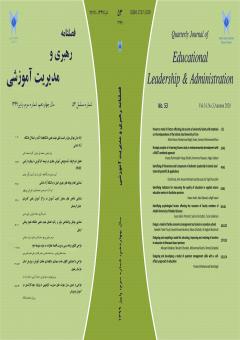Investigating the effectiveness of therapeutic theater on the moral intelligence of third grade students
Subject Areas :Shahed Peyvand 1 , Abolfazl Davodiroknabadi 2 * , Hamidreza Afshar 3 , pejman Dadkhah 4
1 - PhD student, Department of Art Research.Kish, international Branch, Islamic Azad University, Kish Island, Iran
2 -
3 - Professor, Department of Art, School of cinema And Theatre, Iran University of Arts, Tehran, Iran
4 - Assistant professor, Department of Photography, Faculty of Art, Eqbal Lahori Institute of Higher Education, Mashhad, Iran
Keywords: theater therapy, moral intelligence, students.,
Abstract :
Purpose: The purpose of this research was to investigate the effectiveness of therapeutic theater on the moral intelligence of third grade students.
Method: The current research method is semi-experimental and its design is pre-test-post-test with a control group. The statistical population included primary school children in the 4th district of Tehran, among whom 8-9 years old children were randomly selected and examined. The research tool included the standard questionnaire of children's moral intelligence, which was designed by Amini Moghadam et al. (2017). Cronbach's alpha coefficient method was used for the reliability of the tool, and its value was 0.89. Analysis of covariance was used to compare the scores before and after theater therapy and the data was analyzed by SPSS21 software.
Findings: The findings showed that the moral intelligence of students who participated in theater therapy sessions was significantly higher than other students who did not participate in the session (Sig. = 0.000, F = 77.4). In other words, the moral intelligence of the students has increased by performing the therapeutic theater method. Also, the dimensions of moral intelligence showed that students who participated in theater therapy sessions were significantly higher than other students who did not participate in the session.
Conclusion: It can be concluded that therapeutic theater can play a role in improving moral intelligence, therefore, planners can use this method to provide the moral development of children.
امیری، امیر، کدخدایی، محبوبه، درخشانی، مهدی، خیرآبادی، زهره، لواف آرانی، محمدجواد. (1401). اثربخشی تئاتر درمانی بر حساسیت اضطرابی، تنظیم هیجان و اضطراب تعامل اجتماعی بیماران مبتلا به اضطراب اجتماعی، رویش روان شناسی،۱۱ (۵):۱۸۲-۱۷۱.
گاطع زاده، عبدالامیر. (1396). بررسی تاثیر درمانی(سایکو دراما) بر پرخاشگری دانشآموزان پسر، 8(28): 69-78.
میر شجاع مینا سادات، بهنام بهناز، قانونی محسن، صباغی سجاد، حسین پور فاطمه. (1399). تأثیر تئاتر درمانی بر تنظیم شناختی و کیفیت زندگی افراد مبتلابه اسکیزوفرنی، تحقیقات علوم رفتاری، 18(3): ۴۱۶-۴۲۵.
محمدی دولت آباد، مریم، رضاپور میرصالح، یاسر، چوبفروش زاده، آزاده. (1402). اثربخشی تئاتر درمانی بر کاهش پرخاشگری کودکان مبتلا به اختلال بیشفعالی – نقصتوجه، روانشناسی افراد استثنایی، 13(50): 101-128.
Antonaccio, O. Tittle, CR. (2008). Morality,self-control and crime. Criminology. 46 (2): 479-510.
Arastehm, H. Azizishamami, M. Jafarirad, A. Mohammadijozani, Z. (1390). Study moral intelligence of students. Culture Strategy Quarterly. (10- 11): 201-14.
Arslan, C. (2016). Interpersonal problem solving, self-compassion and personality traits in university students. Educational Research and Reviews, 11(7), 474-481.
Arslan, C. (2016). Interpersonal problem solving, self-compassion and personality traits in university students. Educational Research and Reviews, 11(7), 474-481.
Augustine, M. E., & Stifter, C. A. (2015). Temperament, parenting, and moral development: Specificity of behavior and context. Social Development, 24(2), 285-303.
Baharudin, D. Che Amat, MA. Mohd Jailani, MR. Sumari, DF. (2011). The Concept of Forgiveness as a Tool in Counseling Intervention for Wellbeing Enhancement. PERKAMA International Convention, 64.
Farmer, G. & Geller, M. (2003). Applying Psychodrama in the Family Systems Therapy of Bowen. In Gershoni, J. (Ed) Psychodrama in 21st Century clinical and Educational Aplications. Springer Publishing Company.
Flite, CA. Harman, LB. (2013). Code of ethics: Principles for ethical leadership. 40-5
Gordon, CL. Arnette, RAM. Smith, RE. (2011). Have you thanked your spouse today? Felt and expressed gratitude among married couples. Personality & Individual Differences. 50(3): 339-43.
Guilford, JP. (1967). The nature of human intelligence. New York: McGraw – Hill, 43-66.
Hook, JN. (2007). Forgiveness, individualism and collectivism. Master of Science, Thesis, Virginia Commonweals University, 280-8.
Hsu, Y., Chang, C. C., & Liang, C. (2015). The effects of creative personality and psychological influences on imagination. Innovations in Education and Teaching International, 52(6), 587-598.
Javed, A., Kausar, R., & Khan, N. (2014). Effect of School System and Gender on Moral Values and Forgiveness in Pakistani School Children. Malaysian Online Journal of Educational Sciences, 2(4), 13-24.
Karatas, Z., & Gokcakan, Z. (2009). A Comparative Investigation of the Effects of Cognitive-Behavioral Group Practices and Psychodrama on Adolescent Aggression. Educational sciences: Theory and practice, 9(3), 1441-1452.
Karatas, Z., & Gokcakan, Z. (2009). A Comparative Investigation of the Effects of Cognitive-Behavioral Group Practices and Psychodrama on Adolescent Aggression. Educational sciences: Theory and practice, 9(3), 1441-1452.
Nursing Practice, 5(3), 14-9.
Sengsavang, S., & Krettenauer, T. (2015). Children's Moral Self-Concept: The Role of Aggression and Parent–Child Relationships. Merrill-Palmer Quarterly, 61(2), 213-235.
Pylypenko, N., Radchuk, H., Shevchenko, V., Horetska, O., Serdiuk, N., & Savytska, O. (2023). The Psychodrama Method of Group Psychotherapy. BRAIN. Broad Research in Artificial Intelligence and Neuroscience, 14(3), 134-149.
Sternberg, RJ. (1999). Successful Intelligence: Finding a Balance. Trends in Cognitive Sciences. 3 (11): 23-31.
Trémolière, Bastien, De Neys, Wim, & Bonnefon, Jean-François. (2012). Mortality salience and morality: Thinking about death makes people less utilitarian. Cognition, 124(3), 379-384.

